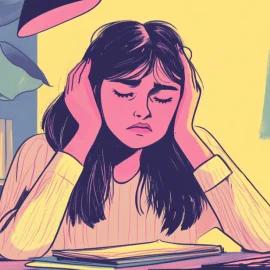

This article is an excerpt from the Shortform book guide to "Order From Chaos" by Jaclyn Paul. Shortform has the world's best summaries and analyses of books you should be reading.
Like this article? Sign up for a free trial here.
What are the effects of ADHD? How does ADHD affect functioning?
In Order From Chaos, Jaclyn Paul argues that people with ADHD face particular organizational challenges that can make their lives feel chaotic and frustrating. People with ADHD also have trouble with their memory and are distracted by their own thoughts.
Let’s explore the effects of ADHD to see if they fit your own symptoms.
What Is ADHD and How Does It Affect Functioning?
Before we dive into the effects of ADHD, we need to explain what it is. ADHD (attention deficit hyperactivity disorder) is a neurobiological condition that impairs working memory and executive function, among other things. Working memory is the capacity to hold information in our brains for immediate use in the short term, such as remembering what you need to retrieve when you walk into another room. Executive functioning refers to a set of skills related to planning ahead and making decisions. Everyone struggles with working memory and executive function from time to time, but for people with ADHD, these deficits occur at a severity and frequency that substantially interferes with their daily lives.
(Shortform note: An estimated 2.8% of adults have ADHD. As Paul’s definition of the condition suggests, ADHD is not characterized by a lack of understanding of what you’re supposed to do, but rather an inability to perform the skills expected of you. While Paul’s definition of ADHD frames executive function and working memory as separate functions, other experts suggest that working memory is a subset of executive functioning, alongside mental flexibility and self-control (both of which are also affected by ADHD).)
According to Paul, ADHD can cause you to be constantly distracted by both your own thoughts and your environment. It can also cause you to make impulsive decisions, struggle to stop a task once you’ve begun it, and have difficulty conforming to common organizational methods. These and other traits can make you disorganized, and being disorganized can then make your symptoms worse, creating a negative cycle.
(Shortform note: The feeling of being perpetually disorganized can make you feel overwhelmed, leading some experts to refer to this negative cycle as “The Cycle of Overwhelm.” This cycle often leads to and is reinforced by ADHD burnout, a state of exhaustion and hopelessness brought on by the struggle to do things others can do easily (such as regulating decisions and behavior and staying organized).)
What’s more, ADHD can have negative impacts on your personal, professional, and social life. People often view ADHDers as lazy and irresponsible, but their behavior is the result of actual differences in their brains, not the result of a character flaw, explains Paul. These differences make certain aspects of life that are easy for most people nearly impossible for ADHDers.
As you work to get more organized, it’s important to avoid judging yourself for the things you struggle with, any more than you would with a physical ailment. Just like you wouldn’t judge a person with epilepsy for taking medication or needing to avoid flashing lights, you shouldn’t judge yourself or other ADHDers for the way their atypical brains affect them.
(Shortform note: The negative view of ADHD traits can be particularly painful for people with ADHD because they often suffer from rejection sensitive dysphoria, an extreme emotional reaction to rejection and criticism characterized by shame, guilt, and even physical pain. This pain is caused and exacerbated by both negative judgment from others and negative self-talk. Thus, understanding that ADHD is not a character flaw is important for both ADHDers and non-ADHDers in order to reduce the stigma around the disorder and make it easier for ADHDers to understand and cope with their symptoms.)
Get Your Symptoms Under Control
According to Paul, the first thing you must do to get organized is to get your ADHD symptoms under control so that you can begin the work of managing the ways in which ADHD affects your life. No matter how strong your organizational system is, it won’t do you any good if your symptoms are so severe that you can’t follow it. For some people, this involves getting on stimulant medication to reduce the severity of their symptoms. Medication will not make your symptoms go away, nor will it make your life easy, but it can help mitigate your symptoms and make your life more manageable. Paul explains that less than a tenth of ADHDers who try stimulant medication are unable to benefit from any of them.
| Types of ADHD Medication To effectively get your symptoms under control, you have to be on the right kind of medication. ADHD medication works by increasing the levels of certain neurotransmitters such as norepinephrine and dopamine in the brain. Paul discusses stimulant medications, which primarily target dopamine, but there are also non-stimulant medications available for ADHD, and these primarily target norepinephrine. Non-stimulants generally have a lower success rate than stimulants but can be very effective for people who don’t respond well to stimulant medications. In addition to medication, lifestyle changes like daily exercise, therapy, adequate sleep, and a healthy diet can help some people better manage their symptoms. However, depending on the type and severity of your symptoms, some of these lifestyle changes may work better as part of your organizational system than as precursors to it. |

———End of Preview———
Like what you just read? Read the rest of the world's best book summary and analysis of Jaclyn Paul's "Order From Chaos" at Shortform.
Here's what you'll find in our full Order From Chaos summary:
- What ADHD is and how it affects cognitive functioning
- How those with ADHD can gain control over their lives and find peace
- How to implement an organization system that works with your needs






